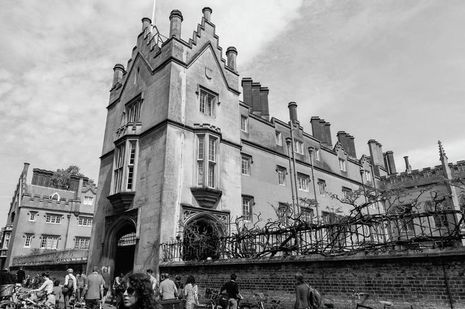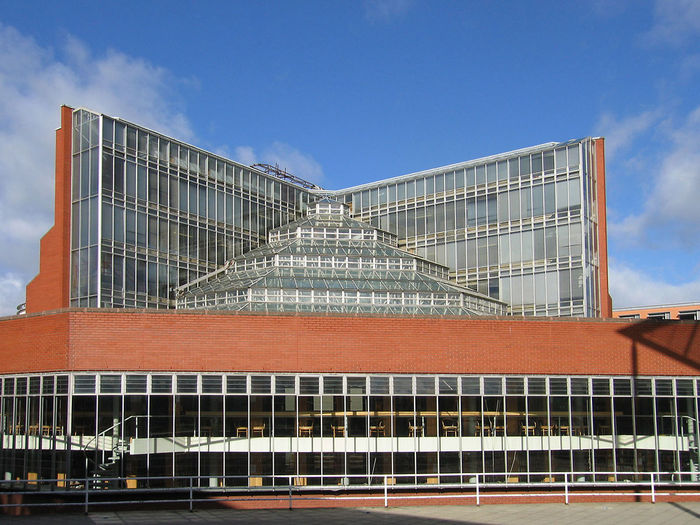Sidney Shame: College accused of neglecting disabled students
Students accuse the college of being ‘wilfully negligent’ of disabled students, with an ‘active animosity’ towards their needs

Multiple sources at Sidney Sussex have alleged that the college is in breach of the Equality Act on several counts regarding its treatment of disabled students, a Varsity investigation can reveal.
- One student was left trapped in a supervision room when a ramp provided was too steep
- Another student dislocated their shoulder trying to get into college while an accessible door was broken
- Lift to 2/3 wheelchair-accessible bedrooms has been broken for three years
- Many disabled students cannot access the JCR, computer room or upper library
We interviewed disabled students at Sidney and their peers, who say that they have complained about the attitude and inaction of the college, but claim that “nothing has been done” to the point that Sidney are “wilfully negligent”. Varsity has seen documentary evidence of these complaints from multiple sources.
The Great Gate, on Sidney Street, is inaccessible for physically disabled students, so they have to enter at the back of college – yet the back gate is frequently broken. One disabled student told Varsity that as a result, they had to go to hospital after dislocating their shoulder trying to open the heavy Great Gate. They complained to the college, but Sidney claimed that the gate cannot be made more accessible for historical reasons.
Poor accessibility also affects students visiting the college, socially or for supervisions. One wheelchair-using student was stuck in a supervision room for at least 30 minutes, after a ramp provided by college was taken away and used elsewhere. The student’s supo partner went to inform the porters and was told that only one ramp was available – after several minutes of discussion, they agreed to come and assist the student.
Varsity understands that the porters suggested lifting and carrying the wheelchair out of the room – but this was “entirely unfeasible”, “due to its size, weight and intricacies”. The student told us that “the whole experience was appalling to witness”, claiming it proved college provisions for disabled students are “utterly insufficient”.
For visitors, there are just three disabled toilets in college: one is card access only and students can’t enter, one is accessible only by going to get a key from porters, and the only other disabled toilet is in the bar, which only Sidney students can get into.
There is also a shortage of accessible accommodation in the college; there are only three bedrooms that are adapted for wheelchair users. Two of these rooms are accessible only by lift – a lift which has been broken for three years. Within this time it’s worked occasionally; estimates vary from ten minutes to two weeks for how long functionality has lasted.
The broken lift means students unable to use stairs can’t access the upper floors of the library or the computer room. By not affording disabled students access to the “benefit, facility or service” of browsing books and using college computers, it has been alleged that Sidney is in breach of the Equality Act. The JCR is also not accessible by wheelchair.
Students have claimed that no wheelchair-using student has matriculated to Sidney for at least three years – and it’s likely that if one were to be accepted that they would want to change colleges, or live off site given the lack of adapted accommodation. If Sidney were to choose not to offer students places due to physical disability, or to pool physically disabled students who apply on the grounds of their disability, this would be in breach of the Equality act.
Students tell us that other “tutorial rooms” allocated based on access needs are not suitable for many physically disabled students due to size and lack of adapted bathrooms, and that the process for applying to accessible accommodation is “bureaucratic, confusing and off-putting”. An email was sent to students last month which said that the college would only consider requests supported by an SSD (Student Support Document), which can only be issued by the ADRC.
When disabled students come to Cambridge, there is no requirement for them to disclose their disability to the University or the ADRC, or to get an SSD. Varsity understands that other colleges allocate accessible rooms without requiring this document. While the JCR later sent an email clarifying that an SSD is not the only route to getting an accessible room, students we spoke to said that the initial email is a sign of a culture that discourages students to ask for their needs.
One student claimed that: “The attitude of senior staff has been: ‘this is the way I want to do it. And if you’re discriminated against because of that, that’s not my problem’”.
In at least two cases, Varsity understands that disabled students have been allocated unsuitable rooms, but have been able to find students in more suitable rooms willing to swap with them. The college has refused to approve such swaps, in some cases without giving reasons. One student told Varsity that “the onus is on disabled students to fight for their basic rights”.
Another student said that it feels like the college is “going above and beyond to deny disabled students accessible rooms”, claiming that there’s “an active animosity towards disabled students’ needs”.
Other areas of the college that are “officially accessible” can only be accessed by ramps acquired from the porters. Varsity understands that the scarcity of such ramps means that it takes students who need them significantly longer than their peers to get anywhere in college. One student told us, “it’s not accessible for students to have to go to the porters for a ramp every time they want to enter a building — it takes away your independence.”
Some students claim that college’s advice about access to supervision rooms and other buildings is unclear, citing “Invisible ramps, that don’t work and aren’t safe” — others told us that they believe a permanent ramp, by the Mong Hall, may be illegally steep.
When students raised concerns with college staff, experiences varied. While some tutors and directors of studies were helpful, students have alleged others, including more senior staff, “just seem not to care”.
Students claimed that staff are “insensitive” and seem to lack training in dealing with the needs of physically disabled students. One student claimed that they were not made aware of available funding for private therapy until after they intermitted, another that their tutor didn’t seem to know what double time was at all.
Another student alleged that the way college deals with disabled students is “dangerous” and “puts people off getting help”. They allege that the attitude of staff means that “If someone’s in a state of crisis, even when it could be life threatening, the thing that everyone says first, is ‘don’t tell college’…The consequences of asking for help can make it not worth it, and I’m really worried that it’ll cause a major incident…I just want something to change”
All of these issues have been raised by students to the college previously, but students told us that “nothing has been done” to the point where college are being “wilfully negligent” – “situations they could have made better, they’ve actively made worse”.
“One day we’ll look back on this and be appalled” that disabled students were ever treated like this.
The JCR responded to the allegations and told Varsity: “The JCR cares deeply about disability access, and has raised many of these issues to the college on multiple occasions. We hope this article provides further encouragement to move forward swiftly on this matter. To any students struggling with accessibility needs – we are here for you, please do continue to reach out to us for any advice or support.”
Sidney Sussex College were approached for comment
 News / Judge Business School advisor resigns over Epstein and Andrew links18 February 2026
News / Judge Business School advisor resigns over Epstein and Andrew links18 February 2026 News / Hundreds of Cambridge academics demand vote on fate of vet course20 February 2026
News / Hundreds of Cambridge academics demand vote on fate of vet course20 February 2026 News / Petition demands University reverse decision on vegan menu20 February 2026
News / Petition demands University reverse decision on vegan menu20 February 2026 News / CUCA members attend Reform rally in London20 February 2026
News / CUCA members attend Reform rally in London20 February 2026 News / Gov grants £36m to Cambridge supercomputer17 February 2026
News / Gov grants £36m to Cambridge supercomputer17 February 2026











